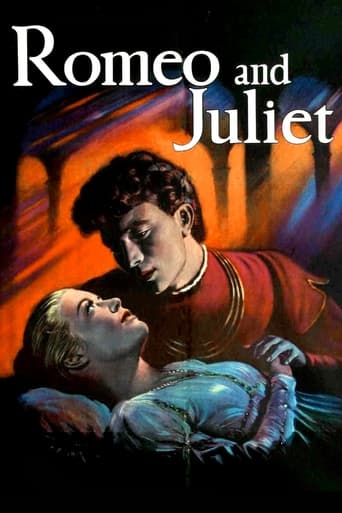leethomas-11621
Queen Mab scene is missing!
I missed any real feeling of happiness between the young lovers before the real tragedy begins. Some stage-like acting means story is viewed from a distance. But the costuming is stunning and the settings real.
I wished Juliet hadn't been played so demurely. The actress seems to always have her gaze averted. I enjoyed Mervyn Johns' Friar Lawrence.
We had to wait another 14 years for Zefferelli's definitive version.
ma-cortes
This lavish British-Italian production about ill-fated and star-crossed lovers deals about the Montagues and Capulets, two feuding families whose young sons Romeo(Laurence Harvey) and Juliet(Susan Shentall) meet and fall in love and whose passion for one another is irresistible. But Juliet's father(Sebastian Cabot) wants marry her to a rich suitor(Norman Wooland)and keep apart Romeo.There are many obstacles on the way and they have to hide their love from the world because both know which their parents will not allow them to be together.The prince of Verona has prohibited duels and fights, but Tybaldo Capulet(Enzo Fiermonte) kills Mercutio and Romeo Montague as revenge murders Tybaldo. The priest friend(Mervyn Johns) prepares a potion for Juliet to simulate her death. Then Romeo is banished to Mantua when he receives the news that Juliet has dead, and happen their tragic destiny.This is one of the best filmed and most pleasant adaptations of Shakespeare's play. Lush production and well-performed, though is handicapped because the two protagonists are too old for the roles, but at the play they were fifteen and fourteen years old respectively.This sumptuously version has the virtue of good and appealing casting, Laurence Harvey, Flora Robson, Mervyn Johns,Bill Travers and a brief introduction by John Gielgud. Exquisitely cinematography by Robert Krasker, a cameraman usual of costumer and historical super-productions(Alexandre the Great,Cid, Fall of the Roman Empire).Hauntingly wonderful musical score by Roman Vlad.The picture is professionally directed by Renato Castenalli, made in Pinewood Studios and Italian location. Anyone interested in tragic love tales and timeless stories will want to watch this cinematic version on Shakespeare tragedy.Another versions about this know story are the following : the vintage classic, Romeo and Juliet(36)by George Cukor with Norma Shearer and Leslie Howard; a dance adaptation(1966)by Paul Czinner with Rudolf Nureyev and Margot Fonteyn; famous rendition(1968) by Franco Zeffirelli with Leonard Whiting and Olivia Hussey; and modern version(1996) by Baz Luhrmann with Leonardo DiCaprio and Claire Danes.
sue-vansanden
I saw this film as a child of 10 or ll. I loved it. I was able to see it again a few years ago, thinking that maybe it would not have the same appeal as when I was a child, but I loved it again, only more appreciatively so. The casting was brilliant and modern versions of this film bear no comparison. I do wish I could obtain it on DVD so my grandchildren could watch it. Apart from anything else, it featured the wonderful actors and actresses of that era who deserved to be remembered. It made an impression on a young child and encouraged further interest and research into the works of Shakespeare. This version of the film is, in my opinion the best interpretation of the author's original play.
tdw25
Handsome, leisurely-paced, ineptly cut, often badly acted (especially by Laurence Harvey as Romeo, surprisingly) version of Shakespeare's most playful and youthful tragedy. Much of the film's charm lies in the creation of sumptuous tableaux in the tradition of Italian Renaissance painting, and the portrayal of Capulet is a marvelously acted stereotype of the fat, crude nouveau riche Italian patriarch; but Harvey (despite a few promising moments early on) is far too effusive and unctuous, creepily reminiscent of John Dall in Rope; Susan Shentall displays admirable coyness and gusto in the "overture" of the dance and courtship scenes, but stiffens and is stifled by the death of a thousand cuts toward the end (although almost nothing is cut from the first act). Still, aside from some ghastly, somnambulistic line readings, the film often dazzles with its feeling for the music of Shakespeare's text; the Nurse's folkloric shanty is highlighted with musical settings (shadings)-- Flora Robson is delightful in the role; the vaguely rappish banter of Benvolio and Romeo's first scene is gracefully and intelligently played. The presentation of the episode of losing the letter due to the Plague is a brilliant use of cinema to bring out embedded narrative in Shakespeare. The near-interchangeability of the actors who play Benvolio, Tybalt and Paris is regrettable.




